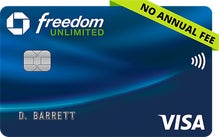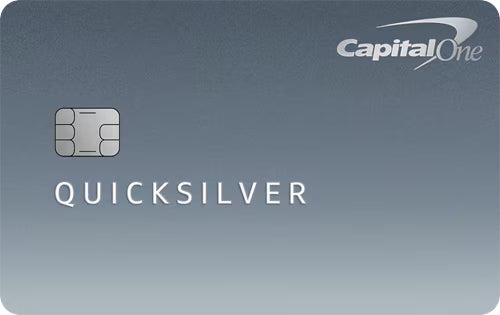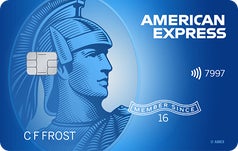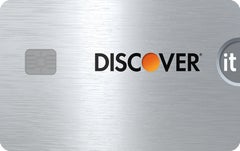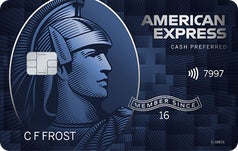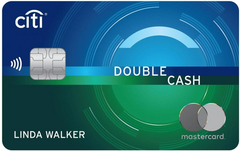Chase Freedom Unlimited® review: Versatility and value for everyday spenders
From generous rewards to flexible redemption options, this card offers high value for no annual fee.
The Bankrate promise
At Bankrate we strive to help you make smarter financial decisions. While we adhere to strict , this post may contain references to products from our partners. Here's an explanation for .
Snapshot
5.0
Bottom line
A consistent favorite, the Chase Freedom Unlimited is an ideal card for nearly any wallet thanks to solid cash back rates and few fees or strings attached. And since it’s part of the Chase Ultimate Rewards ecosystem, it’s the perfect introduction to credit card reward programs.
Best for everyday use
on Chase's secure site
See Rates & FeesIntro offer
Earn $200 cash back
Rewards rate
1.5% - 5%
Annual fee
$0
Regular APR
18.24% - 27.74% Variable
5.0
Bankrate score
Rewards value
APR
Rewards flexibility
Features
Reward Details
Card Details
Remove a card to add another to compare
Remove a card to add another to compare
Chase Freedom Unlimited® overview
Chase Freedom Unlimited® was my first cash back credit card, back when it was simply called Chase Freedom. I got lucky — the card has only grown more impressive since I added it to my wallet. The card’s boosted rewards rate in several useful purchase categories and valuable perks mean that travelers and cash back enthusiasts can find a lot to love. If you want a flat rewards card but also regularly make Chase Travel℠, dining and drugstore purchases, then this card should be near the top of your list.
Although it offers solid cash back in a handful of categories, it doesn’t have boosted rewards for general travel purchases or groceries. These two categories make up the majority of people’s annual spending (including my own), so you may want to pair the Freedom Unlimited with a higher-tier Chase travel credit card to maximize your rewards.
-
Rewards
- 5 percent cash back on travel booked through Chase Travel℠
- 3 percent cash back on dining at restaurants
- 3 percent cash back on drugstore purchases
- 2 percent total cash back on Lyft rides (through Sept. 30, 2027)
- 1.5 percent cash back on all other purchases
Expert Appraisal: Exceptional
See our expert analysis -
Welcome offer
- Earn a $200 Bonus after you spend $500 on purchases in your first 3 months from account opening
Expert Appraisal: Typical
See our expert analysis -
0% intro APR offer
- Regular APR: 18.24% - 27.74% Variable APR
- Purchase intro APR: 0 percent for 15 months
- Balance transfer intro APR: 0 percent for 15 months
- Intro balance transfer fee: $5 or 3 percent of the amount of each transfer, whichever is greater in the first 60 days. After that, $5 or 5 percent (whichever is greater).
Expert Appraisal: Good
See our expert analysis -
Rates and fees
- Annual Fee: $0
- Late payment: $40
- Return payment: $40
- Foreign transaction fee: 3 percent
Expert Appraisal: Typical
See our expert analysis -
Other cardholder perks
- Complimentary DashPass subscription
- Purchase protection and extended warranty coverage
-
Trip cancellation and interruption insurance
Expert Appraisal: Good
See our expert analysis
Chase Freedom Unlimited pros and cons
Pros
-
The card’s flat cash back rate and boosted rates in key purchasing categories make it a top-earning cash back card.
-
Its intro APR offers can help you transfer credit card debt or pay off a big purchase.
-
It has strong benefits for a no annual fee card, including travel cancellation and interruption insurance and complimentary six-month DoorDash DashPass membership.
Cons
-
The card’s 1.5 percent flat cash back rate on general purchases is lower than what you can find on the top flat-rate cards.
-
Some cash back and rewards cards offer longer intro APR periods.
-
The APR is pretty high compared to other cash back cards.
First-year card value vs. ongoing value
Despite possessing few perks or credits, the Freedom Unlimited can rake in more rewards than most flat-rate cash back cards*. By our estimates, an average spender could collect about $325 in a typical year with the Freedom Unlimited.
| Benefits and Costs | First-year value | Ongoing value (no welcome offers) |
|---|---|---|
| Yearly rewards* | +$325 | +$325 |
| Welcome offers | $200 | N/A |
| Perks (of monetary value) | +$59.94 (DoorDash DashPass offer) | N/A |
| Annual fee | -$0 | -$0 |
| Total value | $584.94 | $325 |
*Based on the average cardholder’s estimated $15,900 yearly spend, with consideration for expenditures in the card’s key rewards categories of travel ($1,300), dining ($2,100), drugstores ($600) and all other purchases ($11,900).
Why you might want the Chase Freedom Unlimited
From its rewards program to its generous welcome bonus and intro APR, the Chase Freedom Unlimited is an excellent card that has much to offer.
Rewards rate: Boosted cash back rate in everyday categories
When I originally applied for the Chase Freedom Unlimited (then the Chase Freedom), I was in it for the rewards’ straightforward nature. A cool 1.5 percent back on all eligible purchases was just the speed I needed for a “set it and forget it” strategy. And luckily, as I grew in experience as a cardholder, so did the Chase Freedom Unlimited’s rewards, gaining boosted reward rates in several common spending categories.
Few cards offer 3 percent back at drugstores, and 3 percent cash back on dining, including eligible takeout and delivery purchases in this category. The card also earns Chase Ultimate Rewards points, which you can redeem for cash back at a 1:1 rate or transfer to a Chase premium card for even more value.
The 2 percent rewards rate on Lyft purchases (through Sept. 30 2027) and 5 percent cash back on all travel purchases through Chase Travel℠ give the card a travel focus compared to other flat-rate cards. This played nicely into my years of increased travel as my partner and I sought to explore as much as possible before we had our first kid. With enough typical spending, we managed to pay for round-trip flights to Hawaii for our belated honeymoon.
Rewards program: Flexible and potentially powerful
The Chase Freedom Unlimited offers various redemption options. You can redeem your cash back for a statement credit, direct deposit, travel, gift cards or online purchases at Amazon.com.
But the real value is in combining your rewards with a premium Ultimate Rewards card, like the Chase Sapphire Preferred® Card or Ink Business Preferred® Credit Card. You can transfer rewards to one of Chase’s transfer partners at a 1:1 ratio, which include:
- Air France
- Air Canada
- British Airways
- Emirates
- IHG
- JetBlue
- Marriott Bonvoy
- Southwest Airlines
- United
- Virgin
- World of Hyatt
This feature makes the Chase Freedom Unlimited a crucial part of the popular and valuable Chase trifecta, a three-card combination that allows you to maximize Ultimate Rewards. Though this wasn’t part of why I applied for the card, it was an incentive for me to better learn how to handle my credit cards and parlay that into bigger rewards for my spending.
Welcome offer: Decent return for spending
The Freedom Unlimited card's welcome offer is a fair bonus, offering $200 in cash back after you spend $500 in purchases on your card within the first three months from account opening.
This offer is a slight step down from the previous offer, which offered a potential total of $300 in rewards in eligible boosted reward rates for your first year. The new bonus should be easier to earn for most people in exchange for the small value loss. (And to put it all into perspective, I’m pretty sure the bonus offer I received when I signed up for the card was just $150.)
Cardholder perks: Generous for a card with no annual fee
You won’t find tons of perks on the Chase Freedom Unlimited like those on a travel or luxury card, and it wasn’t what I was looking for when I ultimately chose the Freedom Unlimited. However, the card offers a few handy benefits rarely found on a no annual fee credit card.
Chief among these perks is a complimentary subscription to DashPass, DoorDash’s membership service, after you enroll. DashPass gets you unlimited deliveries with a $0 delivery fee on orders over $12. The Freedom Unlimited comes with six months of free DashPass membership, after which — if you don’t cancel beforehand — you’re automatically enrolled in DashPass for the current monthly rate (usually $9.99 per month) for the following six months. This offer is only valid if you activate it by Dec. 31, 2027.
The card also offers perks designed to save and protect your money, such as purchase and extended warranty protection. If something you bought with the card is damaged or stolen within 120 days of your purchase, Chase covers the cost, up to $500 per claim and $50,000 per account. Plus, eligible U.S. manufacturers’ warranties of three years or fewer on items you purchase with the card are extended by a year.
Trip cancellation and interruption insurance round out the card’s features. These are prized perks when travel plans seem uncertain, and you typically only find this level of coverage with travel cards that charge a hefty annual fee. If your trip is canceled or cut short due to sickness, severe weather or other covered circumstances, Chase may reimburse you for up to $1,500 per person and $6,000 per trip for prepaid tickets and nonrefundable passenger fares. I’ve never had to use this perk thankfully, but I’d rather have it and not need it than need it and not have it.
Intro APR: Save on purchases and balance transfers
On top of a strong rewards program, the Chase Freedom Unlimited also comes with an intro APR on purchases and balance transfers. You rarely see an intro APR on a rewards card — let alone on both purchases and balance transfers. This gives the Chase Freedom Unlimited added flexibility and makes it a good fit whether you want to minimize interest to pay for a large purchase over time or whittle away at transferred card debt.
Keep in mind that a few rewards cards offer longer intro APR offers, and dedicated balance transfer cards have the longest intro APRs available. If this feature is important to you, make sure to shop around.
Why you might want a different cash back card
The Chase Freedom Unlimited is a superb, do-it-all card that fits easily into most wallets. However, before taking the plunge, consider a few of its downsides.
Maximizing rewards: It can get complicated
While earning rewards on the Chase Freedom Unlimited is straightforward because there’s no activation required or rotating categories to worry about, maximizing those rewards is another story. If you want to squeeze more value out of your earned rewards than the standard 1:1 cash back rate, you’ll need to familiarize yourself with the Chase Travel portal. This is where you can redeem your earned points as well as access the Chase Offers program, which can earn extra cash back for purchases at eligible retailers.
If you truly want to get the maximum value of your Chase Ultimate Rewards points, you need to add one of Chase’s premium travel cards to your wallet. The Sapphire Preferred and Chase Sapphire Reserve® cards let you transfer points to eligible travel partners, which could double your point value. This requires some extra legwork and research, which may not suit your reward preferences if you want a more straightforward cash back strategy.
I found the overall process simple enough and greatly enjoyed the extra value it afforded, but it does take a little extra time to move your points around and get everything in order. And again, it requires you to add another card to your wallet, which isn’t going to be the right move for everyone.
Rates and fees: Nothing unexpected
The Chase Freedom Unlimited offers what you’d expect from a rewards card. While it doesn’t have hidden or surprise fees, the card also isn’t doing you any favors in this area.
The card charges a 3 percent foreign transaction fee, which will cut into your cash back earnings if you use it for international purchases.
Plus, Chase charges the greater of $5 or 3 percent of the amount of any balance you transfer, which could be a sizable sum depending on how much you transfer.
The card’s interest rate ranges from slightly lower than the current average to around 30 percent, which makes carrying a balance pretty expensive. Its APR isn’t out of this world, but you could incur some hefty charges if you carry a balance after the intro period. My recommendation is to use this card for your everyday purchases, set up auto-pay for your balance in full each month, and nothing else. You really want this card for the reliable reward value it offers, not the extra utility of cash advances, travel purchases or the like.
We tried it: Here’s what our experts say
The Chase Freedom Unlimited is a versatile enough card that both the rewards points chasers and the easygoing value maximizers on Bankrate’s staff enjoy it in their wallets. Here’s how two other staffers use the card:
Bankrate staff insights
Best cards to pair with the Chase Freedom Unlimited
While the Chase Freedom Unlimited pairs nicely with various rewards cards, there are really two cards you’ll need to put at the top of your priority list after opening the Freedom Unlimited: the Chase Freedom Flex and Chase Sapphire Preferred.
Just watch out for Chase’s 5/24 rule. If you’ve opened five or more cards in the past 24 months, you won’t be eligible to open a Chase credit card.
How the Chase Freedom Unlimited compares to other cash back cards
Many cash back credit cards are available, and most don’t charge an annual fee. Among these cards, however, some stand out because of the benefits they offer or their lucrative sign-up bonuses.

Annual fee
Intro offer
Earn a $200 Bonus after you spend $500 on purchases in your first 3 months from account opening
Rewards rate
Enjoy 5% cash back on travel purchased through Chase Travel℠, our premier rewards program that lets you redeem rewards for cash back, travel, gift cards and more. 3% cash back on drugstore purchases and dining at restaurants, including takeout and eligible delivery service. 1.5% cash back on all other purchases.
Recommended Credit Score
A FICO score/credit score is used to represent the creditworthiness of a person and may be one indicator to the credit type you are eligible for. However, credit score alone does not guarantee or imply approval for any financial product.

Annual fee
Intro offer
Earn a $200 statement credit after you spend $2,000 in purchases on your new Card within the first 6 months.
Rewards rate
Earn 3% cash back at U.S. supermarkets, 3% cash back on U.S. online retail purchases, 3% cash back at U.S. gas stations, on eligible purchases for each category on up to $6,000 per year in purchases (then 1%). Earn 1% cash back on all other eligible purchases.
Recommended Credit Score
A FICO score/credit score is used to represent the creditworthiness of a person and may be one indicator to the credit type you are eligible for. However, credit score alone does not guarantee or imply approval for any financial product.

Annual fee
Intro offer
Earn $200 cash back after you spend $1,500 on purchases in the first 6 months of account opening. This bonus offer will be fulfilled as 20,000 ThankYou® Points, which can be redeemed for $200 cash back.
Rewards rate
Earn 2% on every purchase with unlimited 1% cash back when you buy, plus an additional 1% as you pay for those purchases. To earn cash back, pay at least the minimum due on time. Plus, earn 5% total cash back on hotel, car rentals and attractions booked with Citi Travel.
Recommended Credit Score
A FICO score/credit score is used to represent the creditworthiness of a person and may be one indicator to the credit type you are eligible for. However, credit score alone does not guarantee or imply approval for any financial product.
Is the Chase Freedom Unlimited right for me?
The Chase Freedom Unlimited has plenty to offer for several types of cardholders but shines as part of the Chase trifecta and if you want to maximize reward value. It’s a perfect pick if you:
Love a simple, straightforward rewards card.
Like the idea of eventually branching out into a more robust rewards program.
Want to push your rewards to the limit with the Chase Trifecta.
Alternative picks
Frequently asked questions
How we rated this card
We rate credit cards using a proprietary card scoring system that ranks each card’s estimated average rewards rate, estimated annual earnings, welcome bonus value, APR, fees, perks and more against those of other cards in its primary category.
Each card feature is assigned a weighting based on how important it is to people looking for a card in a given category. These features are then scored based on how they rank relative to the features on other cards in the category. Based on these calculations, each card receives an overall rating of 1-5 stars (with 5 being the highest possible score and 1 being the lowest).
We analyzed over 150 of the most popular rewards and cash back cards to determine where each stacked up based on their value, cost, benefits and more. Here are some of the key factors that influenced this card’s overall score and how the score influenced our review:
* See the online application for details about terms and conditions for these offers. Every reasonable effort has been made to maintain accurate information. However all credit card information is presented without warranty. After you click on the offer you desire you will be directed to the credit card issuer's web site where you can review the terms and conditions for your selected offer.
Editorial Disclosure: Opinions expressed here are the author's alone, and have not been reviewed or approved by any advertiser. The information, including card rates and fees, is accurate as of the publish date. All products or services are presented without warranty. Check the bank’s website for the most current information.
